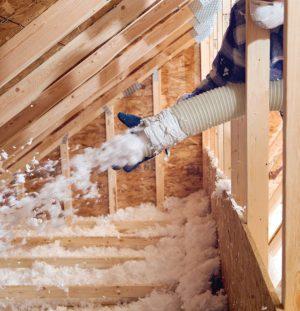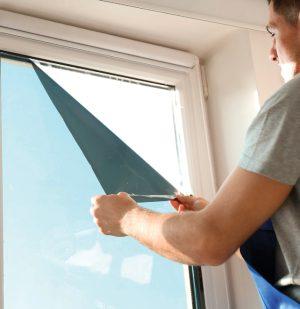 The summer months are full of vacations, barbeques, and other fun outdoor activities. However, the summer heat can also lead to an increase in your home’s energy usage. There is no way to completely avoid energy costs. Even so, there are ways that you can reduce the amount of energy you are using during the summer and throughout the year. Here is a list of areas in your home that may be driving your energy bill up.
The summer months are full of vacations, barbeques, and other fun outdoor activities. However, the summer heat can also lead to an increase in your home’s energy usage. There is no way to completely avoid energy costs. Even so, there are ways that you can reduce the amount of energy you are using during the summer and throughout the year. Here is a list of areas in your home that may be driving your energy bill up.
Insulation
 If you have ever run your home’s air conditioner only to find the house warming up again after a short while, there is a good chance that lack of proper insulation is the root of your problem. Insulation helps keep heat from entering and leaving your home. During the summer, your home’s insulation is essential for preventing the warm air outside from seeping into your house. There is likely insulation all over your home—between your walls, in your roofing, and even under your flooring. However, depending on your house’s age, the insulation may not be as energy-efficient as possible. There is a variety of materials used to insulate homes with the most common being fiberglass and cellulose. Fiberglass insulation can come in batts, which are long strands of fiberglass that are placed throughout your home, or it can be pumped in through a vacuum-like tube. Cellulose is also pumped in through a pressurized tube. There are a few ways to inspect your home’s insulation. To check on the insulation found in your attic, all you will need is a yardstick. Make sure to wear pants, gloves, and a long sleeve shirt when inspecting your insulation, as the small fibers can be quite irritating to the skin. Once in the attic, take your yardstick and place it into the insulation until you feel it hitting your ceiling. Measure the amount of the yardstick that is covered by insulation. For proper insulation, the Department of Energy (DOE) suggests that fiberglass batts should measure between 10-20 inches deep, whereas fiberglass or cellulose that was pumped into your home should be around 8-16 inches deep. If you find that your home does not meet the DOE’s standards, it may be time to get in contact with an HVAC professional to address your home’s insulation needs. Your attic is not the only place that can be causing insulation problems in your home, but it is recommended that you let an HVAC professional inspect the other insulated areas of your house, as it can be difficult to do so without damaging your home.
If you have ever run your home’s air conditioner only to find the house warming up again after a short while, there is a good chance that lack of proper insulation is the root of your problem. Insulation helps keep heat from entering and leaving your home. During the summer, your home’s insulation is essential for preventing the warm air outside from seeping into your house. There is likely insulation all over your home—between your walls, in your roofing, and even under your flooring. However, depending on your house’s age, the insulation may not be as energy-efficient as possible. There is a variety of materials used to insulate homes with the most common being fiberglass and cellulose. Fiberglass insulation can come in batts, which are long strands of fiberglass that are placed throughout your home, or it can be pumped in through a vacuum-like tube. Cellulose is also pumped in through a pressurized tube. There are a few ways to inspect your home’s insulation. To check on the insulation found in your attic, all you will need is a yardstick. Make sure to wear pants, gloves, and a long sleeve shirt when inspecting your insulation, as the small fibers can be quite irritating to the skin. Once in the attic, take your yardstick and place it into the insulation until you feel it hitting your ceiling. Measure the amount of the yardstick that is covered by insulation. For proper insulation, the Department of Energy (DOE) suggests that fiberglass batts should measure between 10-20 inches deep, whereas fiberglass or cellulose that was pumped into your home should be around 8-16 inches deep. If you find that your home does not meet the DOE’s standards, it may be time to get in contact with an HVAC professional to address your home’s insulation needs. Your attic is not the only place that can be causing insulation problems in your home, but it is recommended that you let an HVAC professional inspect the other insulated areas of your house, as it can be difficult to do so without damaging your home.
 Windows
Windows
During the summer, around 76% of the sunlight that enters through your home’s windows becomes heat. Additionally, around 30% of heat is lost through your windows during the winter months. There are a few ways to reduce this percentage to keep your home as energy efficient as possible. One of the most effective ways to reduce energy loss through your windows is to have them replaced with more energy-efficient ones. When purchasing new windows, ensure that the model you are purchasing comes with an Energy Star and/or an NRFC (National Fenestration Rating Council) label. Those organizations’ main goal is to promote energy-efficient products, so it is best to buy windows that come with their seal of approval. For Florida in particular, it is advised to purchase windows that have a low solar heat gain coefficient (SHGC). The SHGC is a measurement that determines how much heat from the sun is entering through your windows. The lower the SHGC, the cooler your home will be. Sometimes, new windows are not an option, but that does not mean you cannot make your current windows more efficient. An excellent way to improve your windows’ efficiency is by repairing any air leaks that may be occurring. Leaks can be found by looking at the edges of both the inside and outside of your windows. If a leak is found, it can be sealed by either caulking or installing a weatherstripping (essentially weatherproof tape). Sunshades, window film, blinds, and curtains are another great way to reduce the amount of energy loss caused by windows.
 Thermostats
Thermostats
Air conditioners are truly a necessity here in Florida. They keep your home cool, allowing you to escape the blistering heat of summer in the Sunshine State. However, a central air conditioner unit uses quite a bit of energy and is often one of the leading cost drivers of your electric bill. The DOE estimates that around 40% of energy costs come from cooling and heating. An A/C unit is controlled by a thermostat. Essentially, all a thermostat does is tell your A/C when to turn off and on. You set your desired temperature on the device, and the thermostat will send a signal to your air conditioner or heater to turn on. The thermostat tells the A/C to turn off when it senses that the temperature you set has been met. When the temperature shifts, the thermostat will again signal to the air conditioner that it needs to start running again. Air conditioners run at a static temperature, meaning that the temperature of the air flowing into your home when the A/C is running does not go up or down—regardless of what temperature you set it to on the thermostat. This means that turning your thermostat down to a lower temperature will not cool down your house faster; it will only run your A/C for a longer duration of time. To save money, it is better to keep your thermostat set at a relatively constant setting. It is recommended to keep your thermostat around 78 degrees during the summer and around 68 degrees during the winter. A great way to save money on your A/C is to invest in a programmable thermostat, which allows you to control exactly how long your air conditioner will run. This is great to save energy when you are not home. You could also consider setting up system zoning in your home. System zoning is the process of having multiple thermostats in your home that can be programmed to different settings. By doing this, you can make sure only the rooms you are using are being treated by the air conditioner—greatly reducing the amount you will spend on your A/C every month. It is doable to set up system zoning on your own, but hiring an HVAC professional is the best way to ensure that your new system will function properly.
Energy bills are a fact of life, but you can take steps to greatly reduce them. Countless factors determine how much energy you use. Consult a professional for help evaluating your energy usage. By having an improved understanding of what those factors are, you can reduce your energy consumption and have a stronger idea of where your money is going every month. For information about free energy audits from the City of Tallahassee, call (850) 891-4968. ![]()
Andy Baker
Home & Yard Magazine






